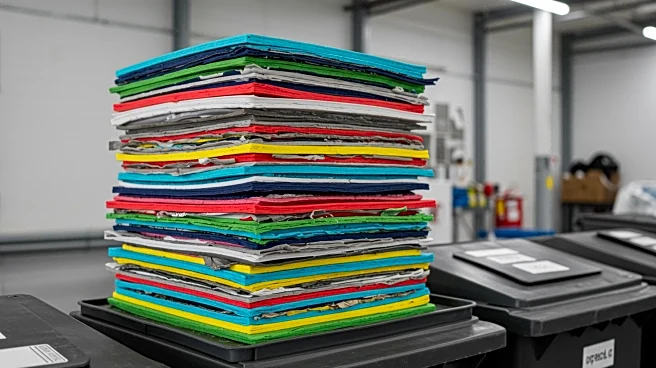What is the story about?
What's Happening?
Recent negotiations in Geneva aimed at establishing a global treaty to reduce plastic pollution ended without agreement. Despite efforts by around 100 countries to impose caps on plastic production, major oil-producing nations like Saudi Arabia and the United States opposed these measures, citing economic concerns. As a result, the focus remains on improving recycling, reuse, and product design to mitigate the environmental and health impacts of plastic waste. The Organisation for Economic Co-operation and Development (OECD) estimates that plastic production could increase by 70% by 2040 without significant changes. Currently, only 6% of plastics are recycled due to the complexity of recycling different types of plastics, which require extensive sorting and processing.
Why It's Important?
The failure to reach a global agreement on plastic production caps highlights the ongoing challenge of balancing environmental concerns with economic interests. Plastics contribute significantly to greenhouse gas emissions, accounting for 3.4% of global emissions in 2019. The reliance on recycling and reuse as primary solutions underscores the need for innovation in material science and infrastructure improvements. However, these efforts face limitations, including the lack of local recycling facilities and markets for recycled materials. The situation calls for a reevaluation of strategies to reduce plastic production and waste, emphasizing the importance of sustainable alternatives and redesigning products for easier recycling.
What's Next?
The focus will likely remain on enhancing recycling infrastructure and consumer education to improve sorting and recycling rates. Innovations in material science may lead to more recyclable products, but significant challenges persist. Cities may need to invest in recycling infrastructure despite limited financial incentives. The ongoing legal actions, such as California's lawsuit against Exxon Mobil, may influence future policies and corporate practices regarding plastic production and recycling.
Beyond the Headlines
The broader implications of the failed treaty talks include ethical considerations regarding the responsibility of major polluting nations to address environmental impacts. The reliance on recycling and reuse raises questions about the effectiveness of these strategies in the long term, given the persistent increase in plastic production. The development of sustainable alternatives, such as materials derived from seaweed, could offer promising solutions but require scaling up to make a significant impact.
















